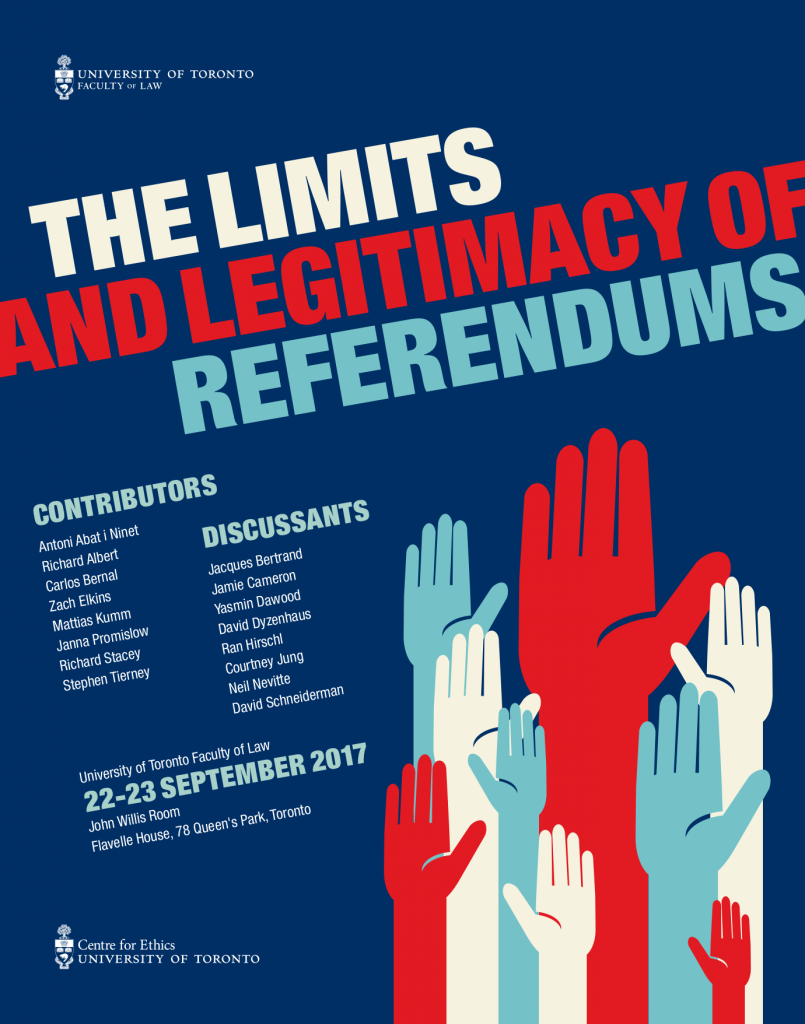 The Limits and Legitimacy of Referenda
The Limits and Legitimacy of Referenda
Writing shortly after the Brexit vote, Kenneth Rogoff decried the use of referenda in modern constitutional democracy: “This isn’t democracy; it is Russian roulette for republics.” Beyond Brexit, many recent majoritarian decisions have concerned matters of real constitutional importance, in Colombia, Hungary, Italy, Crimea, Turkey and Thailand, for example. Referenda are sometimes exalted as the closest we can come to the exercise of popular sovereignty, but few of the world’s most influential constitutions have been ratified by a referendum. On the other hand, some of the referenda we have witnessed recently have not sought to change the formal or written constitution, but nevertheless engage questions of fundamental constitutional significance and national identity. A number of questions follow for scholars and students of public law:
- Has the referendum emerged as a mechanism for effecting change to the fundamental structure of a political community without amending the constitution?
- What is it about the referendum that explains why some notable constitution-making processes and the constitutional amendment procedures of influential constitutions avoid it, while change-makers at this sub-constitutional level embrace it?
- Do referenda raise different questions in constitution-making versus constitution-changing or fundamental political change?
- Under which conditions should referenda be used in making and changing constitutions?
- Are referenda most appropriate for largely homogenous jurisdictions, and to be avoided in heterogeneous ones; or does the promise of referenda lie in their capacity to bridge and indeed to transcend differences, be they ethnic, ideological, geographic or otherwise?
This symposium seeks answers to these and related questions, bringing scholars from around the world to Toronto for two days of discussion, with proceedings to be published in a special issue of the University of Toronto Law Journal. Scholars presenting papers for discussion at the symposium include:
- Antoni Abat Ninet, Law (Copenhagen)
- Richard Albert, Law (BC/Texas)
- Carlos Bernal, Law and Philosophy (Constitutional Court of Colombia)
- Zachary Elkins, Political Science (Texas)
- Mattias Kumm, Law (NYU and Humboldt)
- Janna Promislow, Law (Thompson Rivers)
- Richard Stacey, Law (Toronto)
- Stephen Tierney, Law (Edinburgh)
Discussants include:
- Jacques Bertrand (Toronto)
- Jamie Cameron (Osgoode)
- Yasmin Dawood (Toronto)
- David Dyzenhaus (Toronto)
- Ran Hirschl (Toronto)
- Courtney Jung (Toronto)
- Neil Nevitte (Toronto)
- David Schneiderman (Toronto)
A limited number of seats are open to faculty and graduate students with research interests on the subject of the symposium. To register your interest in attending this program, please click here to complete the form.

Fri, Sep 22, 2017
08:00 AM - 12:45 PM
Faculty of Law, Conference Centre
78 Queen's Park
